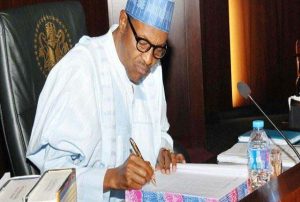Some stakeholders and economic experts in Borno on Wednesday, expressed mixed feelings over the 2017 budget presented by President Muhammadu Buhari.
The News Agency of Nigeria (NAN) reports that some said they were confident about the president’s political will, others predicted a rubust economic outlook in 2017, with drastic economic reforms imminent.
Malam Abdullahi Gana, a civil servant, said the 2016 budget had not yielded much positive results.
“What particular project has been carried out with the 2016 budgetary figures. The citizens haven’t felt the benefits of this year’s budgetary dispensations and are very hungry.
“They cannot find the time to listen or read about 2017 figures when that of 2016 hasn’t helped their lives.
“The government must find a way to circulate money in the ecoñomý so that it gets to the impoverished and hungry citizens,”Gana said.
“President Buhari said the 2017 budget would contain proposals and packages that would lead Nigeria out of the present economic recession.
“We are glad that most of the government policies are targeted at reducing unemployment and poverty, and wealth creation.
“The social intervention programme of N500 billion in the 2017 Budget would go along way to cushion the hardship of Nigerians,” he said.
Bulama Baba, another civil servant, said the effort of the government to diversify the economy was very commendable.
“By declaring that the economy must be diversified, the president has said it all; that is his economic policy and the direction of his government.
“It is left for those in the business environment to change the way business is done, to turn around agriculture, mining, local production of the basic needs of the Nigerian people.
“Come to think of it afterall what is budgeting and how does it affect the welfare of the people.
“Budgets are just guidelines in spending if you have and want to spend or proposals.
“In 2016, the government made a projection (budget)on income and expenditure based on a certain amount of crude sales.
“Unfortunately, that is not realisable because of obvious reasons,fall in crude price which accounts for 80% of governments revenue.
“That has already created a gap and it means readjustment to give more attention to priority areas.”
Malam Muhammad Ciroma said if all proposals that the president presented in the assembly would be executed with integrity, Nigeria would have no cause to be broke.
“It is no doubt that the PMB government has made significant gains in terms of governance and transparency in the oil sector.
“The government must therefore monitor effectiveness of operations at the refineries and show a readiness to tackle difficult issues, especially the Niger Delta militants.”
Mr Muhammad Askira, a lecturer at Ramat Poltytechnic, said: “By what ensued in the 2016 budget, it has brought out the fact that budgets were never wholistically prepared in this country for anything at all.
“It was cut and paste actually, nobody cares so long as money will be made available to be shared, with no accounting procedures followed and budget monitoring non existent.
“Supposing there was no change in government from PDP to APC, you and I would never have known the inadequacies in running the government of Nigeria or any government before, for that matter.
“It was just a bandwagon; people were carried along to ‘eat’ what was offered them and no quetions asked.
“The onus (is) on this administration to put things rightly in place and do things the right way is enough exercise to last it through its first four years,”Askira said.
However, Mr Friday Nwadinobi, a resident of Gwange quarters, said polarisation of the country along so many fault lines was affecting governance.
“The loyalty any leader gets from the civil servants or subordinates depends on ethno religious beliefs or alignment.
“Saboteurs are everywhere. And for a governmemt that has clearly declared war on corruption, when even the head of an arm of governme

